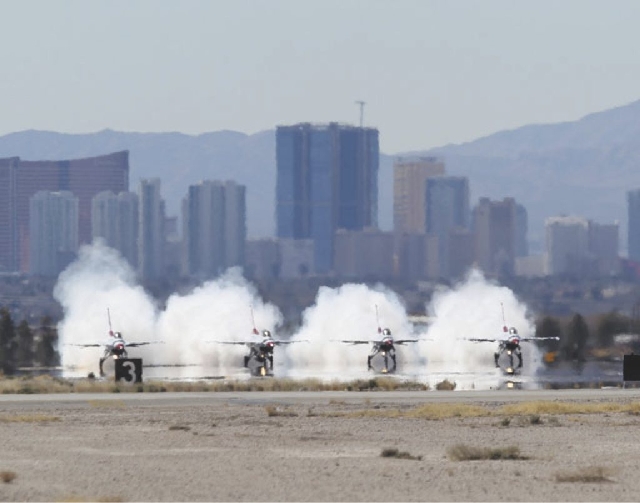Red Flag flies for what may be last time as budget cuts loom

Backed by the Las Vegas skyline with sunlight glistening off their canopies, fighter jet after fighter jet took off Wednesday from Nellis Air Force Base like there was no tomorrow.
And there might not be for Red Flag air combat training exercises after this one ends March 15, unless Congress and the Obama administration forge a pact by Friday to reduce the nation’s $16.6 trillion deficit and avoid automatic budget cuts.
Across-the-board cuts split equally between defense and nondefense programs to reduce $85 billion in spending through the end of September could cancel July’s Red Flag exercise and ground the Thunderbirds demonstration team in April, Air Force officials have said.
In all, 125 aircraft from the United States and the British Royal Air Force rehearsed war games Wednesday over the 2.9-million acre Nevada Test and Training Range.
Three stealthy, black U.S. Air Force B-2 bombers, which look like huge flying wings, flew in from Whiteman Air Force Base, Mo., to participate.
Nellis leaders declined to comment or speculate on what the looming budget cuts could do to the long-standing fighter pilot training exercise that has been an esteemed tradition at the base since the end of the Vietnam War.
They cited uncertainty as to whether budget cuts would take effect.
“Unfortunately, we will not be giving any interviews because nothing is firm. All these things that are out there are ideas on the table, and we won’t know for sure what the impacts will be until a decision is made on what will or will not be cut,” a Nellis spokeswoman, Master Sgt. Kelley Stewart, said earlier this week.
Nellis officials also wouldn’t discuss the fate of the 414th Combat Training Squadron, which runs Red Flag, or reveal any contingency plans if the cuts, known as “sequestration,” kick in.
“No specific Air Combat Command guidance has been provided,” Stewart wrote in an email Wednesday, responding to a Review-Journal query.
“The 414th CTS (Combat Training Squadron) is continuing to plan for future Red Flag exercises and to support any other local exercise events they can during the course of the fiscal year,” she said.
Spearheaded by Gen. Robert Dixon, who commanded the Tactical Air Command, Red Flag was established in 1975 for pilots to hone their skills and reverse the declining air-to-air kill ratio trend that had fallen from about 10-to-1 during the Korean War to less than 2-to-1 during the Vietnam War.
Since its inception, airmen from 28 foreign countries have flown in the exercise, and several others have participated as observers. More than 440,000 U.S. military personnel, including 145,000 air crew members, have racked up 385,000 sorties and more than 660,000 hours of flying time, according to a Nellis fact sheet.
On Feb. 6, Gen. Larry Spencer, the Air Force’s vice chief of staff, said the potential impact from sequestration on Air Force operational training would require cutting 33 percent of the remaining program because roughly half the program’s 1.2 million flight hours will have been flown by the end of February. An 18 percent cut translates to 203,000 fewer flying hours during the fiscal year, which began Oct. 1.
A typical F-15 Eagle fighter jet from the 65th Aggressor Squadron at Nellis burns roughly 5,300 gallons of jet fuel during a two-week Red Flag exercise at a total cost of $19,800.
During the previous Red Flag, which ended Feb. 1, U.S. aircraft consumed 5 million gallons of jet fuel for a combined cost of $18.7 million, Stewart said.
Undersecretary of the Air Force Jamie M. Morin has said shouldering automatic budget cuts after Friday, should Congress and President Barack Obama not reach a debt-reduction agreement, clouds the future of Red Flag.
Given that a $487 billion defense spending cut over a decade was mandated by the Budget Control Act of 2011, Morin said if sequestration takes effect, the Red Flag exercise scheduled for July probably would be canceled.
Likewise, Spencer said the Thunderbirds’ schedule would be discontinued “probably around April 1.”
Stewart said if the Red Flag scheduled for July is canceled, “Nellis will have no obligations to NATO allies or foreign pilots and crews since they will have been notified well before they start deploying here.”
She said, “Air Combat Command will have to determine what level of reimbursement is provided any allies that have expended funds” to prepare for travel to July’s Red Flag exercise.
Contact reporter Keith Rogers at krogers@reviewjournal.com or 702-383-0308.